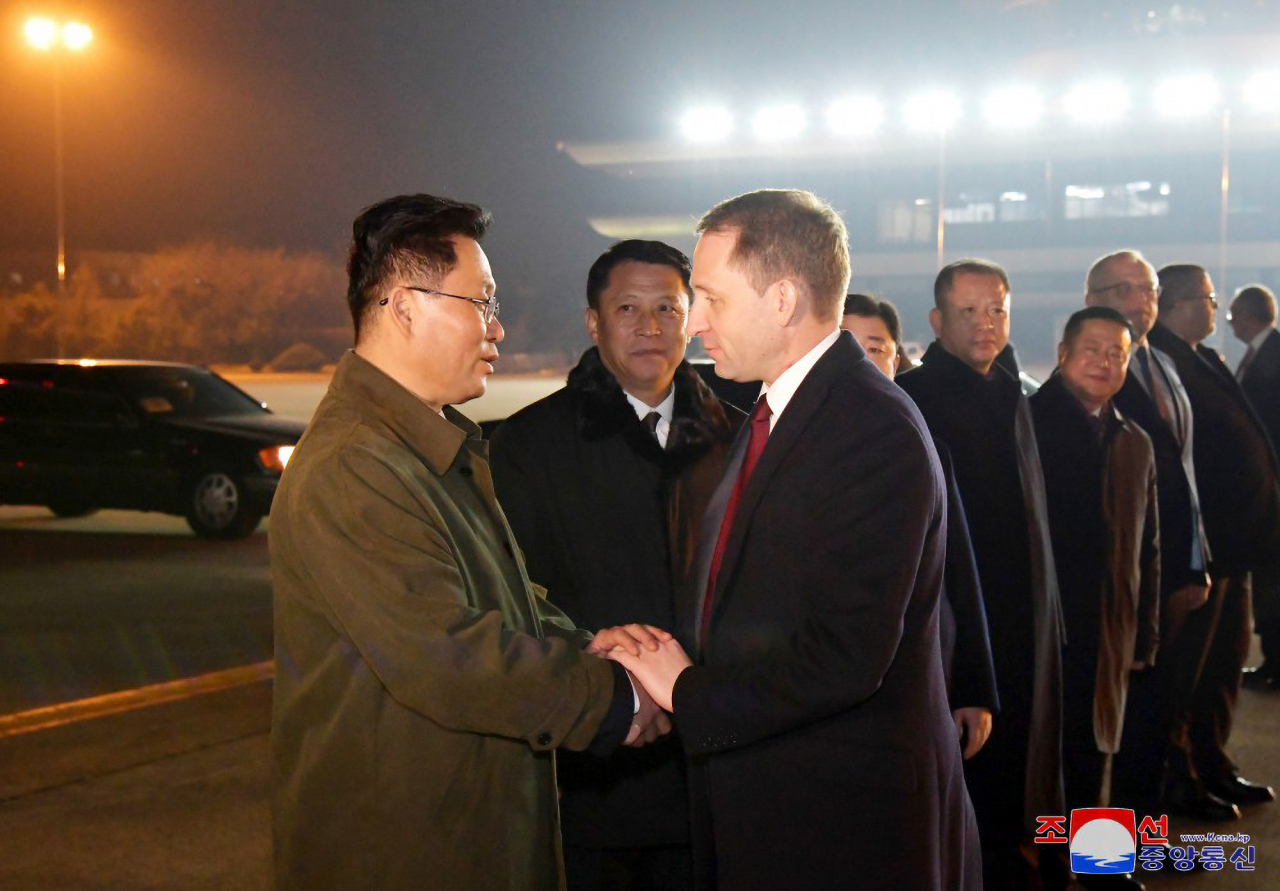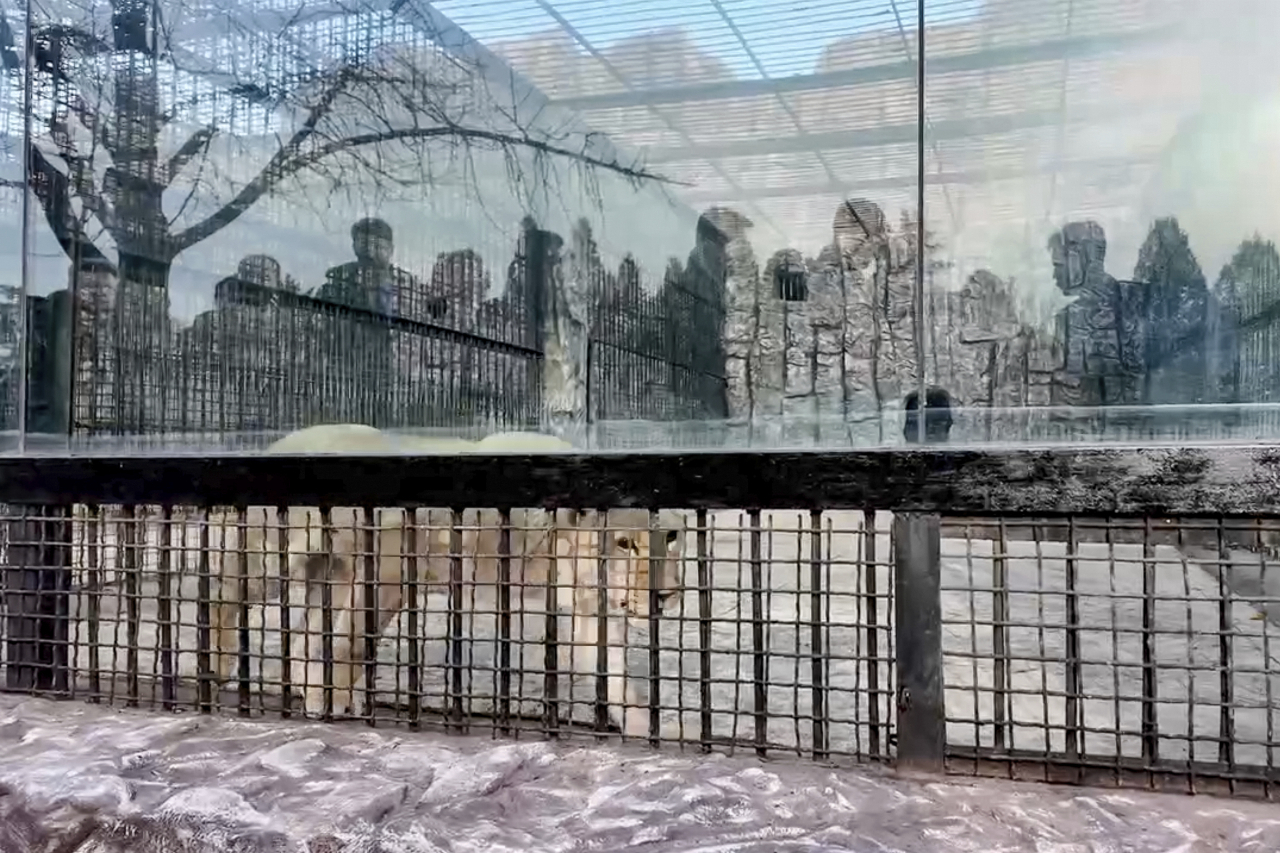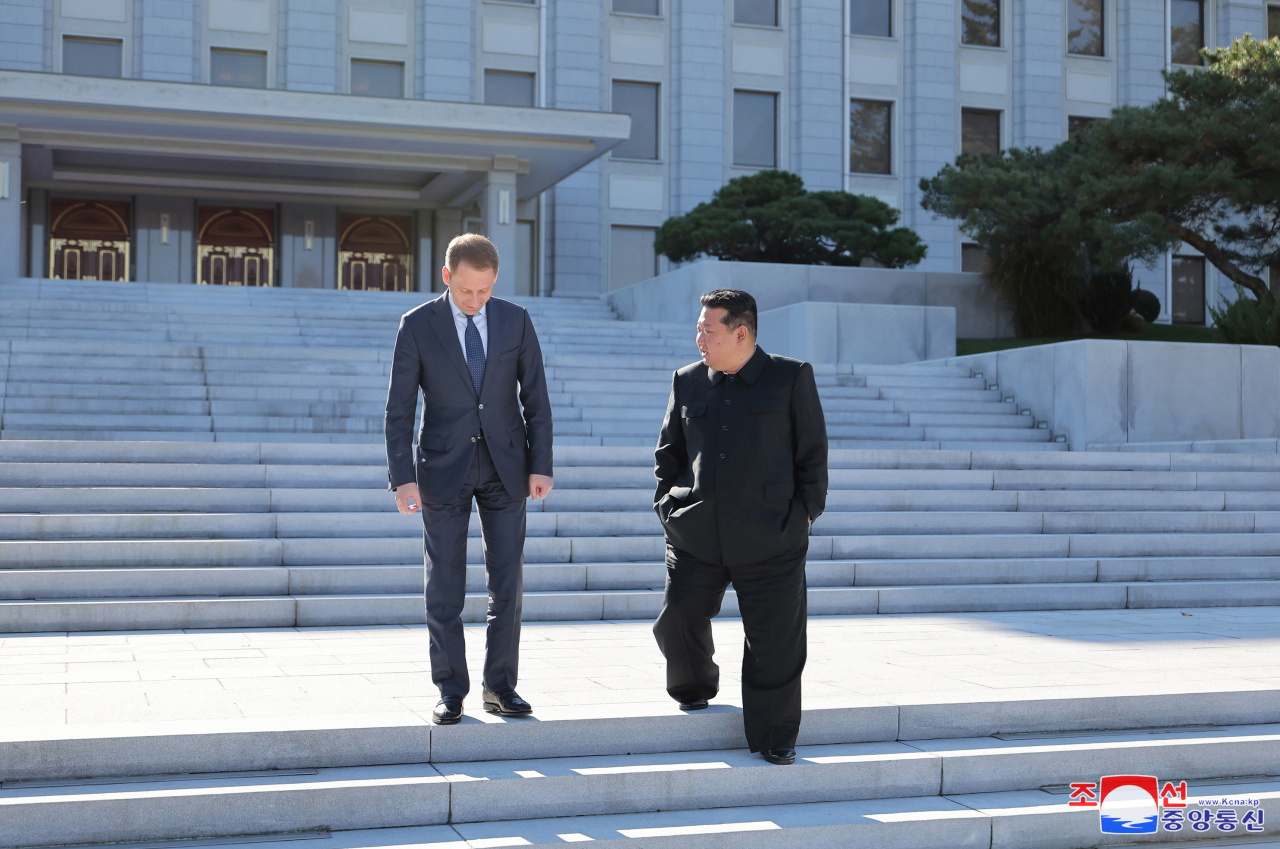 |
Russian Natural Resources and Ecology Minister Alexander Kozlov (right), chairman of the Russian delegation to the North Korea-Russia Intergovernmental Committee for Cooperation in Trade, Economy, Science, and Technology, shakes hands with North Korea's External Economic Relations Minister Yun Jong-ho before departing for Russia on Wednesay. This photo is provided by state-run Korean Central News Agency on Thursday. (Yonhap) |
North Korea and Russia concluded a ministerial meeting in Pyongyang aimed at expanding cooperation in the trade, economic, scientific and technological sectors on Wednesday, at a critical moment when global attention is focused on what Pyongyang might gain in return for dispatching troops to support Russia's war efforts in Ukraine.
The Unification Ministry in Seoul on Thursday noted that neither Pyongyang nor Moscow revealed core agreements in the economic and trade sectors -- areas that could potentially violate UN sanctions against North Korea.
Instead, the two countries strategically emphasized plans in non-sanctioned areas, such as expanding tourism and increasing charter flight operations, while softer aspects of their partnership took center stage, exemplified by President Vladimir Putin’s animal diplomacy through the transfer of over 70 animals to Pyongyang.
North Korea and Russia wrapped the 11th meeting of the Intergovernmental Committee for Cooperation in Trade, Economy, Science and Technology by signing a protocol at Pyongyang’s Mansudae Assembly Hall on Wednesday, according to North Korean state media on Thursday, which offered no further details.
A Russian government delegation, led by Natural Resources and Environment Minister Alexander Kozlov, visited North Korea from Sunday to Wednesday to attend a meeting with a North Korean delegation headed by Minister for External Economic Relations Yun Jong-ho.
North Korean state media briefly reported Wednesday that the 11th meeting on Tuesday “reviewed the implementation of the protocol from the 10th meeting held last year and discussed in detail various bilateral cooperation matters across sectors such as energy, agriculture, science and technology, education, health, and tourism.”
In response, The Unification Ministry assessed that the "truly significant details are likely difficult to disclose due to sanctions on North Korea and other sensitive circumstances."
"The disclosed aspects are those that are free from controversy and do not violate international law or sanctions," a senior ministry official said on condition of anonymity during a press briefing. "Russia's announcement likely did not include the most critical aspects of the discussions between the two countries."
Russia's Ministry of Natural Resources and Environment on Wednesday disclosed further details on what it labeled as "important agreements" in the areas of tourism, sports, culture and education.
Moscow and Pyongyang agreed to expand charter flight services between the two countries, with plans to launch routes not only from the Russian Far East, but also from major cities across Russia.
A Russian language education center is set to be established at Kim Chol Ju University of Education in Pyongyang.
 |
In this photo taken from video released by the Moscow Zoo official telegram channel on Wednesday, Nov. 20, 2024, lion is seen in an enclosure in the zoo of Pyongyang in North Korea after being delivered as a gift from Russian President Vladimir Putin. (Moscow Zoo official telegram channel via AP) |
Both Pyongyang and Moscow also departed from the usual format of previous intergovernmental committee meetings by showcasing unprecedented events not previously included.
North Korean state media also reported Thursday that Putin gifted a selection of "rare animals" delivered by the Russian delegation.
According to the Russian ministry, Putin sent over 70 animals to the Pyongyang Central Zoo, including a female lion, bears and yaks -- marking the first time such a special cohort of mammals was sent to North Korea.
 |
North Korean leader Kim Jong-un (right) walks with Russian Minister of Natural Resources and Ecology Alexandr Kozlov at the Central Committee headquarters of the Workers' Party of Korea in Pyongyang on Monday, as shown in this photo released by the state-run Korean Central News Agency on Tuesday. (Yonhap) |
North Korean leader Kim Jong-un also met Kozlov at the Workers' Party of Korea Central Committee headquarters on Monday. Since the inaugural intergovernmental committee meeting in 1996, this is the seventh of 11 sessions held in Pyongyang and notably the first time a Russian representative has met North Korea's leader during such an event.
During the meeting, Kim called for the two countries to "broaden and continuously promote intergovernmental trade, economic, and scientific-technical exchanges and cooperation in a more multifaceted manner in alignment with the DPRK-Russia friendly and cooperative relations having risen to a new strategic level," according to North Korean state media on Tuesday. The DPRK refers to North Korea's official name, the Democratic People's Republic of Korea.
Kim's unprecedented in-person reception of the Russian representative may be tied to the economic benefits North Korea could receive in exchange for deploying troops.
The unnamed Unification Ministry official said, "Chairman Kim's meeting with Minister Kozlov likely aimed to express optimism for economic exchanges between the two countries."
On the same day as Kim's warm reception, a notable development was the arrival in Pyongyang of a delegation from Russia’s Military Academy of the General Staff of the Armed Forces, led by its president, Vladimir Zarudnitski, according to North Korean state media.




![[Herald Interview] How Gopizza got big in India](http://res.heraldm.com/phpwas/restmb_idxmake.php?idx=644&simg=/content/image/2024/11/20/20241120050057_0.jpg)

![[KH Explains] Dissecting Hyundai Motor's lobbying in US](http://res.heraldm.com/phpwas/restmb_idxmake.php?idx=644&simg=/content/image/2024/11/20/20241120050034_0.jpg)
